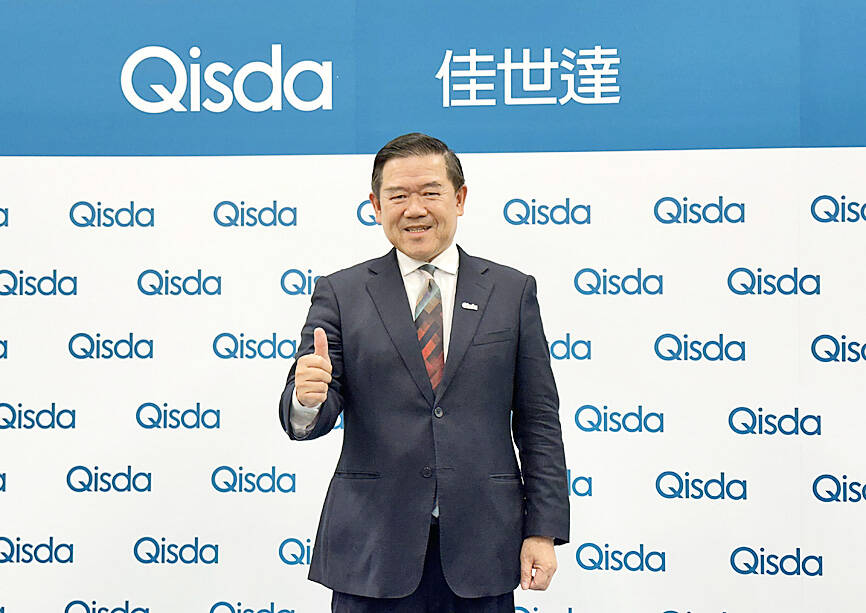Electronics manufacturer Qisda Corp (佳世達) yesterday said revenue performance in the second half of the year would be flat from the first half, as third-quarter sales came in lower than expected amid weak demand for information technology (IT) products and networking and communication devices.
The company expects its high valued-added businesses — including hospital operations, medical products, smart business solutions and networking and communications products — to provide stable support to its revenue this quarter, with demand for IT products, mainly monitors and projectors, slowly picking up, it said in a presentation document released following the company’s earnings conference.
The company remains confident that profit performance in the second half of the year would be better than the first half, Qisda chairman Peter Chen (陳其宏) said, citing continued improvement in gross margin.

Photo: Fang Wei-chieh, Taipei Times
Gross margin, a key profitability gauge, increased 2.2 percentage points year-on-year to 16.6 percent in the July-to-September quarter, and rose 2.3 percentage points to 16.3 percent in the first three quarters of the year, both the highest in 20 years, which Chen attributed to contributions from high value-added products and services.
“After revenue from high value-added businesses accounted for more than half of the top line last year, the company’s next goal is to see those businesses contribute more than half of the bottom line by 2027,” he said.
As for next year, Chen said the visibility of the industry remains unclear, given factors such as the war between Russia and Ukraine, the conflict between Israel and Hamas, and sticky inflation worldwide. As a result, the company is to hold a cautiously optimistic view about its revenue and earnings outlook next year, he said.
The company’s consolidated revenue last quarter decreased 3.34 percent quarter-on-quarter and was down 16.13 percent year-on-year to NT$50.37 billion (US$1.56 billion) due to slower-than-expected recovery in monitor shipments and delayed delivery of networking and communications devices such as Internet protocol cameras, routers and switches.
Net profit grew 17.3 percent quarterly to NT$1.2 billion, which translated into earnings per share of NT$0.61, due to an increase in non-operating gains. But net profit still fell 81.1 percent annually, the company said.
In the first three quarters, revenue dropped 16.76 percent year-on-year to NT$152.93 billion and net profit decreased 67.67 percent to NT$2.55 billion, with earnings per share of NT$1.3, it said.
The IT business accounts for 43 percent of the company’s overall revenue in the first three quarters, followed by smart business solutions at 16 percent, networking and communications segment at 14 percent, medical business at 12 percent, high value-added services at 8 percent and 7 percent for other products, the company said.

Taiwan Semiconductor Manufacturing Co (TSMC, 台積電) last week recorded an increase in the number of shareholders to the highest in almost eight months, despite its share price falling 3.38 percent from the previous week, Taiwan Stock Exchange data released on Saturday showed. As of Friday, TSMC had 1.88 million shareholders, the most since the week of April 25 and an increase of 31,870 from the previous week, the data showed. The number of shareholders jumped despite a drop of NT$50 (US$1.59), or 3.38 percent, in TSMC’s share price from a week earlier to NT$1,430, as investors took profits from their earlier gains

In a high-security Shenzhen laboratory, Chinese scientists have built what Washington has spent years trying to prevent: a prototype of a machine capable of producing the cutting-edge semiconductor chips that power artificial intelligence (AI), smartphones and weapons central to Western military dominance, Reuters has learned. Completed early this year and undergoing testing, the prototype fills nearly an entire factory floor. It was built by a team of former engineers from Dutch semiconductor giant ASML who reverse-engineered the company’s extreme ultraviolet lithography (EUV) machines, according to two people with knowledge of the project. EUV machines sit at the heart of a technological Cold

CHINA RIVAL: The chips are positioned to compete with Nvidia’s Hopper and Blackwell products and would enable clusters connecting more than 100,000 chips Moore Threads Technology Co (摩爾線程) introduced a new generation of chips aimed at reducing artificial intelligence (AI) developers’ dependence on Nvidia Corp’s hardware, just weeks after pulling off one of the most successful Chinese initial public offerings (IPOs) in years. “These products will significantly enhance world-class computing speed and capabilities that all developers aspire to,” Moore Threads CEO Zhang Jianzhong (張建中), a former Nvidia executive, said on Saturday at a company event in Beijing. “We hope they can meet the needs of more developers in China so that you no longer need to wait for advanced foreign products.” Chinese chipmakers are in

AI TALENT: No financial details were released about the deal, in which top Groq executives, including its CEO, would join Nvidia to help advance the technology Nvidia Corp has agreed to a licensing deal with artificial intelligence (AI) start-up Groq, furthering its investments in companies connected to the AI boom and gaining the right to add a new type of technology to its products. The world’s largest publicly traded company has paid for the right to use Groq’s technology and is to integrate its chip design into future products. Some of the start-up’s executives are leaving to join Nvidia to help with that effort, the companies said. Groq would continue as an independent company with a new chief executive, it said on Wednesday in a post on its Web